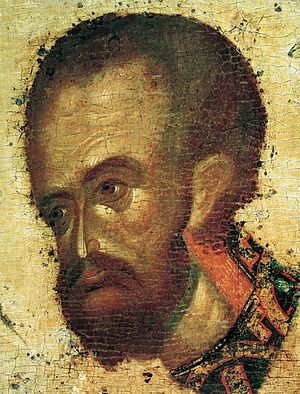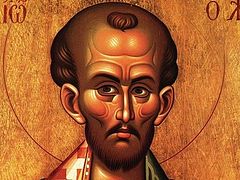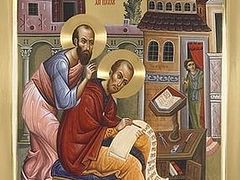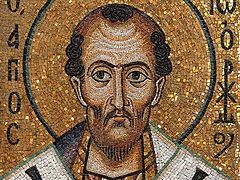This homily on the commemoration of St. John Chrysostom was given on the 1500th anniversary of his repose in 1907 by the holy new hieromartyr of Russia, Archpriest John Vostorgov (1864–1918).
What Orthodox Christian has not heard the name of St. John Chrysostom? There is hardly another such honored saint whom Christ’s Church commemorates so often—almost every day all in of its holy churches. We are indebted to him for composing the Divine Liturgy that is most often celebrated in our church; to him are we indebted for many wondrous prayers that still touch every soul. His life is forever filled with instruction; for example, of firm faith, unwavering dutiful service regardless of all obstacles, limitless dedication to the holy Church, and the great ascetical labors of love of neighbor that is part of this dedication. His massive works—sermons, instructions, Gospel exegesis, books, letters and epistles—all of this remains forever an unsurpassed example of deep thought, eloquence, the fervency of a loving heart, and inexhaustible edification for believers of all times, nations, and peoples.
It is just such a saint, one the greatest of all great saints, whom we glorify today with grand solemnity on the occasion of the 1500th year since his martyric repose.
We honor the Golden-Tongued John, gilded in the golden radiance of teaching, and who enlightened the world with his speech, shining brightly with gold and filled with light, radiating divine grace. Thus the church hymns glorify the great holy hierarch. For all of these 1500 years [now 1610 years.—Trans.] the Christian world has bowed before his unprecedented gifts of mind and word, and the great feat of his life; and as long as Christ’s Church shall exist, it will never forget this righteous man, universal teacher and luminary. Pious souls will always draw wisdom and illumination from his works, and his example will ever edify those who seek edification.
And now, on the day of this grand celebration in honor of the God-pleaser, we not only remember him with grateful praise and fervent prayer to him, not only with hymns do we magnify Chrysostom—although we know that it is hard to express in words the grandeur of his gifts and sanctity—but we try to find in his life lessons and instructions, and examples for emulation.
Of course it is impossible to imitate the brilliant gifts of his mind, knowledge, and unique, truly inimitable eloquence, which gave for all ages to him alone the praiseworthy name of Chrysostom [Golden-Tongue]. This is a gift of God. Once Chrysostom himself, when praising the apostle Paul and marveling at his grandeur, noted for the edification of his listeners, “Although he was Paul, he was still a man.” This is precisely how we speak of John: Although he was Chrysostom, he was still a man, and much of what was human in him is close to us, accessible to our understanding and possible to emulate.
Born to a wealthy and aristocratic family, having received what was a high education for his time, having seen from his early years the recognition of his brilliant talents, having lived in the capital city of the East, and with a brilliant future in secular service ahead of him, St. John nevertheless gave all the outstanding gifts, abilities, strengths, and treasures of his soul to God, and dedicated himself to service of the Church. Humbly declining the honor of a bishropric in his youth, as a church reader in his native city of Antioch he would depart to the mountains as a simple novice monk, then return to the world with spiritual strength. He served in the church as a deacon, and then as a simple priest. He was surrounded by exuberant praise of his wisdom and inimitable eloquence, but he remained a humble servant of Christ’s Church—he visited the sick, gave charity to the poor, tirelessly celebrated the divine services, tirelessly preached, explained the Holy Scriptures, and taught the faithful. He rejoiced with the joys of his flock, and he grieved over their sorrows. Of weak health, he was often unable to endure such ceaseless and uninterrupted work and lay exhausted on his bed of sickness; but at the first opportunity, still sick and weak, he again took up his pastoral work and teaching. St. John deeply believed and taught us that only service to the Church can bring salvation to the world and mankind, that only the deepening and spread of Christian laws of faith and piety can establish our earthly life for the good.
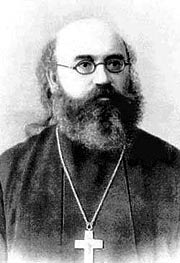 Holy Hieromartyr John Vostorgov
Holy Hieromartyr John Vostorgov May we have this wisdom also, according to the testament of life and words of St. John. He beautifully portrays the strength and influence of whole-Church unity and prayer. “As a harbor in the sea, shielded from winds and waves, provides complete safety to the ships that enter it, so also does God’s house, as if wrenching those who enter it from the storms of worldly activity, allow them to stand quietly and safely and hear the word of God. The church is the school of the virtues, the institute of the love of wisdom not only during services but also before and after them. Enter upon its threshold and a kind of spiritual breeze blows upon your soul. This quietude instills fear of God and teaches love of wisdom; it awakens the mind and does not allow you to remember the present, but transports you from earth to heaven. If it be so beneficial just to be here without a gathering, then what benefit does it bring those who are present here, and what loss do those who are absent suffer, when the prophets proclaim, when the apostles preach the gospel, when Christ stands in our midst, when the Father approves what takes place here, when the Holy Spirit imparts its joy?”
St. Chrysostom applied every effort so that the word of Christ’s gospel would resound throughout all the ends of the earth and to all peoples far and near. Armenia and Phoenicia, Persia and the Black sea; and what is especially dear to us, our ancestors on the Dnieper, within the boundaries of our Russia, heard that word of God from the lips of preachers sent by St. John Chrysostom, when he was raised from Antioch to the heights of the patriarchal throne in Constantinople.
With great courage Chrysostom defended the truth of Christ from attacks by heretics and pagans. He considered that emperors are called to guard the Church from the outside through the power of government, and pastors of the Church should strengthen it with the power of words and their own good Christian life, as well as that of their flock. He stood before the king and called for laws against salacious and impure pagan games and festivals, and against the Arian heretics’ triumphal processions and goings on in the city. When the powerful and tyrannical dignitary, the Arian Gaina, demanded that a church be turned over to the Arians in Constantinople, and the emperor, fearing this dignitary and concerned about possible vengeance from the armies he had gathered, agreed to his demands, St. John courageously told him that the king is obligated to place the needs of the Church and Orthodoxy above his own state advantage. As proof of his rightness St. John showed the emperor the decree of his pious father, who forbade the Arians from having houses of worship in the capital. Gaina himself bowed before the saint and submitted to his exhortations; although he was a heretic he nevertheless accepted and saw that the good of the Church and the benefit of the nation required the full protection of all the rights of Orthodoxy in an Orthodox empire. “And we are waging war (with heresy),” said Chrysostom, “but our war does not make the living dead, but the dead to live. I do not persecute the heretic but the heresy, not the sinner but the sin.”
Shouldn’t it be the same in our Orthodox kingdom? And in serving our homeland we should first and foremost reckon its well-being, honor, and glory to be that Orthodoxy in our kingdom should flourish and reign, so that the gospel of Christ’s name would spread from Russia to all heterodox countries and peoples. Just the same, may this never be implemented through force or external law. St. John Chrysostom confirmed the preaching of God’s word and the broadening of the Church’s boundaries first of all by his personal sanctity and piety. His love for people was measureless; his love for the poor and dispossessed was inexpressible, for because of it in his youth he gave away his possessions, and during the years as patriarh he sold even church adornments and vessels in order to feed the poor and lowly with the money received. With courage and pastoral firmness he taught the rich, so that they might help the poor with their possessions—although many hated him for this and he had to endure criticism and persecution. “Many,” he said, “condemn me for rebuking the wealthy. But why then are they unfair to the poor? Are you rich? I do not hinder you. But are you a robber? I judge you. Both the poor man and the rich man are equally my children.” “It is not only robbery to take what is not yours, but also to not share a portion of your possessions with the poor.”
Chrysostom feared impiety more than anything in the world. He taught that, “there is only one evil—sin; and there is no good other than virtue.”
Envy of his talents and high position, hatred of him for rebuking sin and impiety wove a thorny crown of suffering for Chrysostom. The emperor’s wife and the vain women in her circle, the rebuked rich people, bishops and priests who were laid low for their iniquity and impiety—all of these united together achieved a sentence upon John Chrysostom by lawless judges, deprived him of his cathedra, and exiled him to a distance land. He died in exile on the shores of the Black sea, within the regions of the Russian homeland, in a place called Comana, in the church of the village of Vasilka, on November 14/25, 407. But throughout all the persecutions and harassment, never did he for a moment abandon his pastoral duty—he served to the end, preached, consoled, rebuked, taught, and gave instructions that inclined people toward the good of the Church. He said, “Let everything be against me: defamation, scorn, mockery, slander, the sword, fire, hunger, sickness, and every cruel thing that can happen in this life; I will go my own way.” Thus was the strength of dedication St. John Chrysostom had for his duty.
Great was his guilelessness and forgiveness of enemies, great was his patience in exile, where he endured the guards’ coarse treatment, heat and cold, hunger and thirst. His repose was touching. The guards took him to the very edge of the empire, to wild countries, to exile and banishment. Finally he was exhausted from his terrible sufferings, and his end was visibly near. In the solitary church of the Martyr Basilisk near the city of Comana, he and his guards stopped on their journey. That night the holy martyr Basilisk appeared to him and said, “Be of good courage, John! Tomorrow we will be together.” The next day the guards again tried to drag St. John further on, but seeing his complete exhaustion and closeness to death, they were forced to turn back. St. John asked the priest for new, white priestly vestments; pure and uncorrupted, in clean white garments, he sang his final earthly hymn to the Lord with the words of those wondrous prayers that he himself had composed and left for the Church as a legacy. The dying righteous man prayed fervently; with faith and hope in eternal life he received Communion of the Holy Mysteries of Christ for the last time. Then in his exhaustion he lay on the floor of the church at the altar of the Lord—he who had served the Church, the temple and the altar all his life crossed himself and pronounced his last earthly homily: “Glory to God for all things!” Then he stretched out and shuddered, his gaze was extinguished, and his soul flew to God. This was the day of the Exaltation of the Cross of the Lord; St. John had carried his cross of life up to the very threshold of eternity with love and self-sacrifice. Thus was his spirit strengthened and weakened by struggle and suffering.
Chrysostom himself wrote from his exile, from his place of suffering, “In struggles the human spirit is strengthened by the very trials he suffers. This is the nature of sorrows: They raise those who experience them calmly and magnanimously far above all sufferings. The tree that grows in the shade is deprived of strength and becomes incapable of producing fruit. But those that are subjected to all the changes of air, the blowing of winds, and the rays of the sun are full of strength, dressed in leaves, and covered with fruits.”
So also we who emulate the saint’s life, in the care, dissemination and glory of Christ’s holy Name and Church, for the primacy and sovereignty of our holy Orthodoxy, through the example and testament of St. Chrysostom, first of all by our living Christianity, to the measure of the strength given to us must radiate the name of God and preach His glory.
We could continue weaving a laurel of praise endlessly to the universal teacher glorified today, but what we have said is sufficient to make our prayer to him ardent: “Grace shining forth from your lips like a beacon has enlightened the universe. It has shown to the world the riches of poverty; it has revealed to us the heights of humility. Teaching us by your words, O Father John Chrysostom, intercede before the Word, Christ our God, to save our souls!”[1] Enough has been said, so that bowing down before the wondrous sanctity of the Golden-Tongued teacher, we would learn from his virtues. Enough has been said for us today to reasonably and consciously, with love and fervency to glorify the righteous one and praise God, Who gave strength of spirit to St. Chrysostom and crowned him with the incorruptible crown of righteousness. As one holy teacher of the Church (St. Isidore of Pelusium) asks, “Can there be so insensate a man who would not give thanks to Providence, which gave the world such a resplendent luminary?”
And it is meet before our prayer to the saint to give him praise with the words of the holy Church: “Earthly angel and heavenly man, sounding bird of beneficial words, eloquent treasure of the virtues, equal in rank with the angels, equal in honor to the apostles—in hymns let us magnify Chrysostom!”
Amen.

